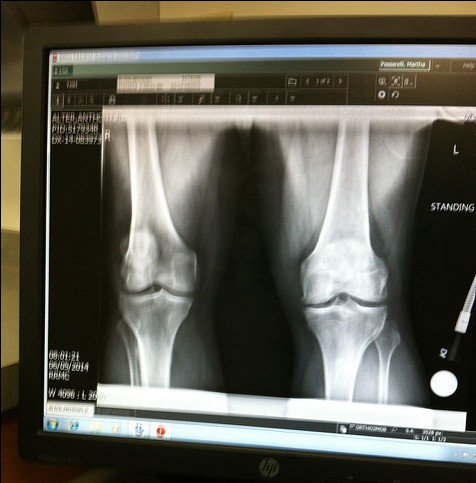Kaiser Health News reports that international health experts and patients say that for knee pain its best to avoid arthroscopic surgery. According to the study published in BMJ, people with degenerative knee disease, that is osteoarthritis, or tears to their meniscus, are better off with exercise and therapy than with surgery.
Years ago, I looked into this after a meniscal tear myself (a meniscus is a piece of cartilage that acts as a cushion between bones in the knee). Injuries to menisci often get better with physical therapy, anti-inflammatory medicine like ibuprofen, and maintaining a healthy weight. More serious injuries such as ruptures of anterior cruciate ligaments (ACL) which I also managed to do, require surgery if one is going to continue in a sports career or participate in an activity that puts torsion on the knee such as skiing.
But for many of us, again, physical therapy and keeping the muscles strong around the knee and body weight under control may be the better choice, as studies show that those who have surgery have three times the risk of developing osteoarthritis later. As with many studies, there is a caveat. The higher risk of osteoarthritis may be related, as the study cited notes, to repeated injuries, since people who get the surgeries may do so in order to continue in activities that may cause them to re-traumatize their knees.
To arrive at this recommendation, researchers looked at 13 studies of 1,700 patients who received arthroscopic surgery. They found that the overwhelming majority of these patients neither gained relief from their pain nor improved mobility from the surgery. The small fraction who did see improvement in function or pain relief a few months following the surgery did not see it last for more than a year.
In addition, surgery always has attendant risks, including infection.
Arthroscopic knee surgery entails a few small cuts around the knee that permits the surgeon to see inside with a small camera and remove any damaged tissue or cartilage. It is a common procedure for repairing meniscal and ACL tears. It is generally not recommended for patients with arthritis since it has not been found to reduce arthritic pain.
Here’s more from Just Care:











I had meniscus tears and lost the ACLs of one knee in a league soccer injury some 30 years ago at about age 30.
This was at the time when arthroscopic surgery was still an overnight hospital visit.
The doctor (who serviced knees of the NYC pro sports world) trimmed the meniscus, saying the tears to it were deep enough that there was good probability of a flap being able to fold over itself and cause another dislocation.
So I would say, understand clearly the extent of a meniscus tear, and factor that into the decision of whether or not to treat with surgery.
The doctor recommended not doing replacement surgery for the missing ACLs because, at that time, treatment involved harvesting donor material from elsewhere in body and a minimum one year rehab.
I used a Lenox Hill Derotation Brace as a substitute for the ACLs, which worked adequately, though I retired from soccer a year later anyway.
But I did continue on with a 30 year career in martial arts, and stopped using the brace after a few years, as I began to trust the muscles running through the knee joint to give the needed support.
For living with missing ACLs, I would be clear that those muscles surrounding the knee must be in good shape, one cannot get by with a “weekend warrior” approach.
And finally, be clear that any sport requiring cleated shoes require either healthy ACLs, or a Lenox Hill type of derotation knee brace.